- Home
- Friedrich Nietzsche
The Portable Nietzsche Page 4
The Portable Nietzsche Read online
Page 4
Thus the Greeks, the most humane men of ancient times, have a trait of cruelty, a tigerish lust to annihilate—a trait that is also very distinct in that grotesquely enlarged mirror image of the Hellenes, in Alexander the Great, but that really must strike fear into our hearts throughout their whole history and mythology, if we approach them with the flabby concept of modern “humanity.” When Alexander has the feet of Batis, the brave defender of Gaza, pierced, and ties him, alive, to his carriage, to drag him about while his soldiers mock, that is a revolting caricature of Achilles, who maltreats Hector’s corpse in a similar fashion at night; and even this trait is offensive to us and makes us shudder. Here we look into the abyss of hatred. With the same feeling we may also observe the mutual laceration, bloody and insatiable, of two Greek parties, for example, in the Corcyrean revolution. When the victor in a fight among the cities executes the entire male citizenry in accordance with the laws of war, and sells all the women and children into slavery, we see in the sanction of such a law that the Greeks considered it an earnest necessity to let their hatred flow forth fully; in such moments crowded and swollen feeling relieved itself: the tiger leaped out, voluptuous cruelty in his terrible eyes. Why must the Greek sculptor give form again and again to war and combat in innumerable repetitions: distended human bodies, their sinews tense with hatred or with the arrogance of triumph; writhing bodies, wounded; dying bodies, expiring? Why did the whole Greek world exult over the combat scenes of the Iliad? I fear that we do not understand these in a sufficiently “Greek” manner; indeed, that we should shudder if we were ever to understand them “in Greek.”
But what lies behind the Homeric world, as the womb of everything Hellenic? For in that world the extraordinary artistic precision, calm, and purity of the lines raise us above the mere contents: through an artistic deception the colors seem lighter, milder, warmer; and in this colorful warm light the men appear better and more sympathetic. But what do we behold when, no longer led and protected by the hand of Homer, we stride back into the pre-Homeric world? Only night and terror and an imagination accustomed to the horrible. What kind of earthly existence do these revolting, terrible theogonic myths reflect? A life ruled only by the children of Night: strife, lust, deceit, old age, and death. Let us imagine the atmosphere of Hesiod’s poem, already hard to breathe, made still denser and darker, and without all the mollifications and purifications that streamed over Hellas from Delphi and from numerous abodes of the gods; let us mix this thickened Boeotian atmosphere with the gloomy voluptuousness of the Etruscans; then such a reality would wring from us a world of myth in which Uranos, Cronos, Zeus, and the wars with the Titans would seem like a relief: in this brooding atmosphere, combat is salvation; the cruelty of victory is the pinnacle of life’s jubilation.
Further, it was in truth from murder and the expiation of murder that the conception of Greek law developed; so, too, the nobler culture takes its first wreath of victory from the altar of the expiation of murder. After the wave of that bloody age comes a trough that cuts deep into Hellenic history. The names of Orpheus, Musaeus, and their cults reveal the consequences to which the uninterrupted spectacle of a world of struggle and cruelty was pressing: toward a disgust with existence, toward the conception of this existence as a punishment and penance, toward the belief in the identity of existence and guilt. But it is precisely these consequences that are not specifically Hellenic: in this respect, Greece is at one with India and the Orient in general. The Hellenic genius was ready with yet another answer to the question, “What is a life of struggle and victory for?” and it gave that answer through the whole breadth of Greek history.
To understand it, we must start with the point that the Greek genius tolerated the terrible presence of this urge and considered it justified; while the Orphic movement contained the idea that a life with such an urge as its root was not worth living. Struggle and the joy of victory were recognized—and nothing distinguishes the Greek world from ours as much as the coloring, so derived, of individual ethical concepts, for example, Eris3 and envy. . . .
And not only Aristotle but the whole of Greek antiquity thinks differently from us about hatred and envy, and judges with Hesiod, who in one place calls one Eris evil—namely, the one that leads men into hostile fights of annihilation against one another—while praising another Eris as good—the one that, as jealousy, hatred, and envy, spurs men to activity: not to the activity of fights of annihilation but to the activity of fights which are contests. The Greek is envious, and he does not consider this quality a blemish but the gift of a beneficent godhead. What a gulf of ethical judgment lies between us and him! . . .
The greater and more sublime a Greek is, the brighter the flame of ambition that flares out of him, consuming everybody who runs on the same course. Aristotle once made a list of such hostile contests in the grand manner; the most striking of the examples is that even a dead man can still spur a live one to consuming jealousy. That is how Aristotle describes the relationship of Xenophanes of Colophon to Homer. We do not understand the full strength of Xenophanes’ attack on the national hero of poetry, unless—as again later with Plato—we see that at its root lay an overwhelming craving to assume the place of the overthrown poet and to inherit his fame. Every great Hellene hands on the torch of the contest; every great virtue kindles a new greatness. When the young Themistocles could not sleep because he was thinking of the laurels of Miltiades, his urge, awakened so early, was finally set free in the long contest with Aristides, to become that remarkably unique, purely instinctive genius of his political activity, which Thucydides describes for us. How characteristic are question and answer when a noted opponent of Pericles is asked whether he or Pericles is the best wrestler in the city, and answers: “Even when I throw him down, he denies that he fell and attains his purpose, persuading even those who saw him fall.”
If one wants to observe this conviction—wholly undisguised in its most naïve expression—that the contest is necessary to preserve the health of the state, then one should reflect on the original meaning of ostracism, for example, as it is pronounced by the Ephesians when they banish Hermodorus: “Among us, no one shall be the best; but if someone is, then let him be elsewhere and among others.” Why should no one be the best? Because then the contest would come to an end and the eternal source of life for the Hellenic state would be endangered. . . . Originally this curious institution is not a safety valve but a means of stimulation: the individual who towers above the rest is eliminated so that the contest of forces may reawaken—an idea that is hostile to the “exclusiveness” of genius in the modern sense and presupposes that in the natural order of things there are always several geniuses who spur each other to action, even as they hold each other within the limits of measure. That is the core of the Hellenic notion of the contest: it abominates the rule of one and fears its dangers; it desires, as a protection against the genius, another genius.
Every talent must unfold itself in fighting: that is the command of Hellenic popular pedagogy, whereas modern educators dread nothing more than the unleashing of so-called ambition. . . . And just as the youths were educated through contests, their educators were also engaged in contests with each other. The great musical masters, Pindar and Simonides, stood side by side, mistrustful and jealous; in the spirit of contest, the sophist, the advanced teacher of antiquity, meets another sophist; even the most universal type of instruction, through the drama, was meted out to the people only in the form of a tremendous wrestling: among the great musical and dramatic artists. How wonderfull “Even the artist hates the artist.” Whereas: modern man fears nothing in an artist more than the emotion of any personal fight, the Creek knows the artist only as engaged in a personal fight. Precisely where modern man senses the weakness of a work of art, the Hellene seeks the source of its greatest strength. What, for example, is of special artistic significance in Plato’s dialogues is for the most part the result of a contest with the art of the orators, the sophists, and the dramati
sts of his time, invented for the purpose of enabling him to say in the end: “Look, I too can do what my great rivals can do; indeed, I can do it better than they. No Protagoras has invented myths as beautiful as mine; no dramatist such a vivid and captivating whole as my Symposion; no orator has written orations like those in my Gorgias—and now I repudiate all this entirely and condemn all imitative art. Only the contest made me a poet, a sophist, an orator.” What a problem opens up before us when we inquire into the relationship of the contest to the conception of the work of art!
However, when we remove the contest from Greek life we immediately look into that pre-Homeric abyss of a terrifying savagery of hatred and the lust to annihilate. This phenomenon unfortunately appears quite frequently when a great personality is suddenly removed from the contest by an extraordinarily brilliant deed and becomes hors de concours in his own judgment, as in that of his fellow citizens. The effect is almost without exception a terrifying one; and if one usually infers from this that the Greek was incapable of enduring fame and happiness, one should say more precisely that he was unable to endure fame without any further contest, or the happiness at the end of the contest. There is no clearer example than the last experiences of Miltiades. Placed on a solitary peak and elevated far above every fellow fighter by his incomparable success at Marathon, he feels a base, vengeful craving awaken in him against a Parian citizen with whom he has long had a feud. To satisfy this craving he misuses fame, state property, civic honor—and dishonors himself. . . . An ignominious death sets its seal on his brilliant heroic career and darkens it for all posterity. After the battle of Marathon the envy of the heavenly powers seized him. And this divine envy is inflamed when it beholds a human being without a rival, unopposed, on a solitary peak of fame. Only the gods are beside him now—and therefore they are against him. They seduce him to a deed of hybris,4 and under it he collapses.
Let us note well that, just as Miltiades perishes, the noblest Greek cities perish too, when through merit and good fortune they arrive at the temple of Nike from the racecourse. Athens, who had destroyed the independence of her allies and then severely punished the rebellions of her subjects; Sparta, who expressed her domination over Hellas after the battle of Aegospotamoi, in yet much harsher and crueler ways, have also, after the example of Miltiades, brought about their own destruction through deeds of hybris, as proof that without envy, jealousy, and ambition in the contest, the Hellenic city, like the Hellenic man, degenerates. He becomes evil and cruel; he becomes vengeful and godless; in short, he became “pre-Homeric.” . . .
NOTES (1873)
Deification of success is truly commensurate with human meanness. Whoever has closely studied even a single success knows what factors (stupidity, wickedness, laziness, etc.) have always helped—and not as the weakest factors either. It is mad that success is supposed to be worth more than the beautiful possibility which was still there immediately before. But to find in history the realization of the good and the just, that is blasphemy against the good and the just. This beautiful world history is, in Heraclitean terms, “a chaotic pile of rubbish.” What is strong wins: that is the universal law. If only it were not so often precisely what is stupid and evil!
(VI, 334 f.)
Hegel says: “That at the bottom of history, and particularly of world history, there is a final aim, and that this has actually been realized in it and is being realized—the plan of Providence—that there is reason in history: that is to be shown philosophically and thus as altogether necessary.” And: “A history without such an aim and without such a point of view would be merely a feeble-minded pastime of the imagination, not even a children’s fairy tale, for even children demand some interest in stories, i.e., some aim one can at least feel, and the relation of the occurrences and actions to it.” Conclusion: Every story must have an aim, hence also the history of a people and the history of the world. That means: because there is “world history” there must also be some aim in the world process. That means: we demand stories only with aims. But we do not at all demand stories about the world process, for we consider it a swindle to talk about it. That my life has no aim is evident even from the accidental nature of its origin; that I can posit an aim for myself is another matter. But a state has no aim; we alone give it this aim or that.
(VI, 336)
On the mythology of the historical. Hegel: “What happens to a people and occurs within it has its essential significance in its relation to the state; the mere particularities of the individuals are most remote from this subject matter of history.” But the state is always only the means for the preservation of many individuals: how could it be the aim? The hope is that with the preservation of so many blanks one may also protect a few in whom humanity culminates. Otherwise it makes no sense at all to preserve so many wretched human beings. The history of the state is the history of the egoism of the masses and of the blind desire to exist; this striving is justified to some extent only in the geniuses, inasmuch as they can thus exist. Individual and collective egoisms struggling against each other —an atomic whirl of egoisms—who would look for aims here?
Through the genius something does result from this atomic whirl after all, and now one forms a milder opinion concerning the senselessness of this procedure —as if a blind hunter fired hundreds of times in vain and finally, by sheer accident, hit a bird. A result at last, he says to himself, and goes on firing.
(vi, 336 f.)
The damned folk soull When we speak of the German spirit we mean Luther, Goethe, Schiller, and a few others. It would be better even to speak of Lutherlike people, etc. We want to be careful about calling something German: in the first place, it is the language; but to understand this as an expression of the folk character is a mere phrase, and so far it has not been possible to do so with any people without fatal vagueness and figures of speech. Greek language and Greek “folk”! Let somebody bring them together! Moreover, it is the same as with writing: the most important basis of the language is not Greek but, as one now says, Indo-Germanic. It is somewhat better with style or the human being. To ascribe predicates to a people is always dangerous; in the end, everything is so mixed that a unity develops only late, through the language—or an illusion of unity. Germans, German Reich—that is something. Those speaking German—that is something too. But those of German race! What is German as a quality of artistic style—that is yet to be found, just as among the Greeks the Greek style was found only late: an earlier unity did not exist, only a terrible mixture.
(VI, 338 f.)
FROM On Truth and Lie in an Extra-Moral Sense5
(1873)
In some remote corner of the universe, poured out and glittering in innumerable solar systems, there once was a star on which clever animals invented knowledge. That was the haughtiest and most mendacious minute of “world history”—yet only a minute. After nature had drawn a few breaths the star grew cold, and the clever animals had to die.
One might invent such a fable and still not have illustrated sufficiently how wretched, how shadowy and flighty, how aimless and arbitrary, the human intellect appears in nature. There have been eternities when it did not exist; and when it is done for again, nothing will have happened. For this intellect has no further mission that would lead beyond human life. It is human, rather, and only its owner and producer gives it such importance, as if the world pivoted around it. But if we could communicate with the mosquito, then we would learn that it floats through the air with the same self-importance, feeling within itself the flying center of the world. There is nothing in nature so despicable or insignificant that it cannot immediately be blown up like a bag by a slight breath of this power of knowledge; and just as every porter wants an admirer, the proudest human being, the philosopher, thinks that he sees the eyes of the universe telescopically focused from all sides on his actions and thoughts.
It is strange that this should be the effect of the intellect, for after all it was given only as an aid to the most unfort
unate, most delicate, most evanescent beings in order to hold them for a minute in existence, from which otherwise, without this gift, they would have every reason to flee as quickly as Lessing’s son. That haughtiness which goes with knowledge and feeling, which shrouds the eyes and senses of man in a blinding fog, therefore deceives him about the value of existence by carrying in itself the most flattering evaluation of knowledge itself. Its most universal effect is deception; but even its most particular effects have something of the same character.
The intellect, as a means for the preservation of the individual, unfolds its chief powers in simulation; for this is the means by which the weaker, less robust individuals preserve themselves, since they are denied the chance of waging the struggle for existence with horns or the fangs of beasts of prey. In man this art of simulation reaches its peak: here deception, flattery, lying and cheating, talking behind the back, posing, living in borrowed splendor, being masked, the disguise of convention, acting a role before others and before oneself—in short, the constant fluttering around the single flame of vanity is so much the rule and the law that almost nothing is more incomprehensible than how an honest and pure urge for truth could make its appearance among men. They are deeply immersed in illusions and dream images; their eye glides only over the surface of things and sees “forms”; their feeling nowhere leads into truth, but contents itself with the reception of stimuli, playing, as it were, a game of blindman’s buff on the backs of things. Moreover, man permits himself to be lied to at night, his life long, when he dreams, and his moral sense never even tries to prevent this—although men have been said to have overcome snoring by sheer will power.

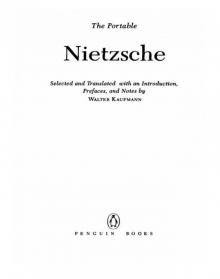 The Portable Nietzsche
The Portable Nietzsche Twilight of the Idols/The Anti-Christ
Twilight of the Idols/The Anti-Christ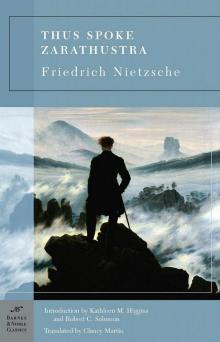 Thus Spoke Zarathustra
Thus Spoke Zarathustra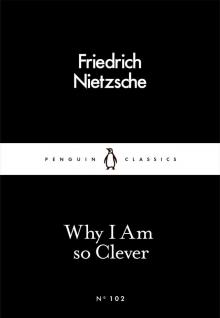 Why I Am So Clever
Why I Am So Clever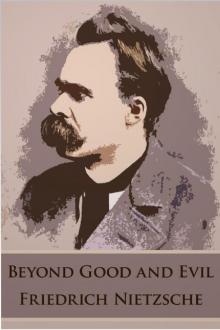 Beyond Good and Evil
Beyond Good and Evil Twilight of Idols and Anti-Christ
Twilight of Idols and Anti-Christ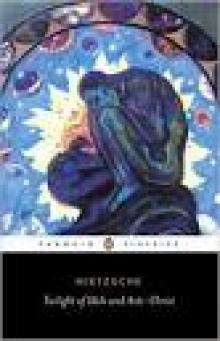 Twilight of Idols and Anti-Christ (Penguin Classics)
Twilight of Idols and Anti-Christ (Penguin Classics)